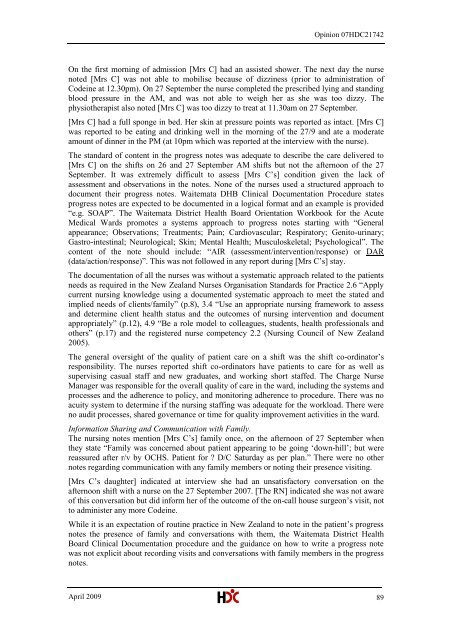North Shore Hospital report - New Zealand Doctor
North Shore Hospital report - New Zealand Doctor
North Shore Hospital report - New Zealand Doctor
Create successful ePaper yourself
Turn your PDF publications into a flip-book with our unique Google optimized e-Paper software.
Opinion 07HDC21742On the first morning of admission [Mrs C] had an assisted shower. The next day the nursenoted [Mrs C] was not able to mobilise because of dizziness (prior to administration ofCodeine at 12.30pm). On 27 September the nurse completed the prescribed lying and standingblood pressure in the AM, and was not able to weigh her as she was too dizzy. Thephysiotherapist also noted [Mrs C] was too dizzy to treat at 11.30am on 27 September.[Mrs C] had a full sponge in bed. Her skin at pressure points was <strong>report</strong>ed as intact. [Mrs C]was <strong>report</strong>ed to be eating and drinking well in the morning of the 27/9 and ate a moderateamount of dinner in the PM (at 10pm which was <strong>report</strong>ed at the interview with the nurse).The standard of content in the progress notes was adequate to describe the care delivered to[Mrs C] on the shifts on 26 and 27 September AM shifts but not the afternoon of the 27September. It was extremely difficult to assess [Mrs C‘s] condition given the lack ofassessment and observations in the notes. None of the nurses used a structured approach todocument their progress notes. Waitemata DHB Clinical Documentation Procedure statesprogress notes are expected to be documented in a logical format and an example is provided―e.g. SOAP‖. The Waitemata District Health Board Orientation Workbook for the AcuteMedical Wards promotes a systems approach to progress notes starting with ―Generalappearance; Observations; Treatments; Pain; Cardiovascular; Respiratory; Genito-urinary;Gastro-intestinal; Neurological; Skin; Mental Health; Musculoskeletal; Psychological‖. Thecontent of the note should include: ―AIR (assessment/intervention/response) or DAR(data/action/response)‖. This was not followed in any <strong>report</strong> during [Mrs C‘s] stay.The documentation of all the nurses was without a systematic approach related to the patientsneeds as required in the <strong>New</strong> <strong>Zealand</strong> Nurses Organisation Standards for Practice 2.6 ―Applycurrent nursing knowledge using a documented systematic approach to meet the stated andimplied needs of clients/family‖ (p.8), 3.4 ―Use an appropriate nursing framework to assessand determine client health status and the outcomes of nursing intervention and documentappropriately‖ (p.12), 4.9 ―Be a role model to colleagues, students, health professionals andothers‖ (p.17) and the registered nurse competency 2.2 (Nursing Council of <strong>New</strong> <strong>Zealand</strong>2005).The general oversight of the quality of patient care on a shift was the shift co-ordinator‘sresponsibility. The nurses <strong>report</strong>ed shift co-ordinators have patients to care for as well assupervising casual staff and new graduates, and working short staffed. The Charge NurseManager was responsible for the overall quality of care in the ward, including the systems andprocesses and the adherence to policy, and monitoring adherence to procedure. There was noacuity system to determine if the nursing staffing was adequate for the workload. There wereno audit processes, shared governance or time for quality improvement activities in the ward.Information Sharing and Communication with Family.The nursing notes mention [Mrs C‘s] family once, on the afternoon of 27 September whenthey state ―Family was concerned about patient appearing to be going ‗down-hill‘; but werereassured after r/v by OCHS. Patient for ? D/C Saturday as per plan.‖ There were no othernotes regarding communication with any family members or noting their presence visiting.[Mrs C‘s daughter] indicated at interview she had an unsatisfactory conversation on theafternoon shift with a nurse on the 27 September 2007. [The RN] indicated she was not awareof this conversation but did inform her of the outcome of the on-call house surgeon‘s visit, notto administer any more Codeine.While it is an expectation of routine practice in <strong>New</strong> <strong>Zealand</strong> to note in the patient‘s progressnotes the presence of family and conversations with them, the Waitemata District HealthBoard Clinical Documentation procedure and the guidance on how to write a progress notewas not explicit about recording visits and conversations with family members in the progressnotes.April 2009 89
















